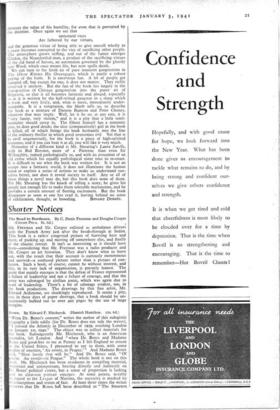Shorter N otices
The Road to Bordeaux. By C. Denis Freeman and Douglas Cooper (Cresset Press. 8s. 6d.)
MR. FREEMAN and Mr. Cooper enlisted as ambulance drivers with the French Army just after the break-through at Sedan. This book is a rather congested picture of hurrying here and there, of packing up and moving off somewhere else, and finally of the chaotic retreat. It isn't as interesting as it should have beenāconsidering that Mr. Freeman was a radio producer and Mr. Cooper an art historian. They don't know what to leave out, with the result that their account is curiously monotonous and unvividāa confused picture rather than a picture of con- fusion. Such a book, of course, cannot be without interest, and this, in its very lack of organisation, is patently honest. The point that mainly emerges is that the defeat of France represented a failure of leadership and not a failure of courage, and that the army was sabotaged by civilian panic, which was again due to want of leadership. There's a bit of sabotage evident, too, in the book production. The drawings by that fine artist, Mr. Edward Ardizzone, are shockingly reproduced. It seems a pity, too, in these days of paper shortage, that a book should be un- necessarily bulked out to over aoo pages by the use of large margins.






























 Previous page
Previous page